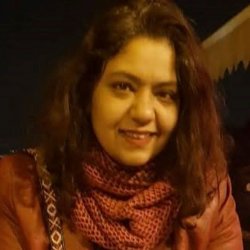
Dr Adeeba Ahmad
Academic and research departments
Language, Literacies and Learning Research Group, Surrey Institute of Education.About
My research project
To what extent does Mandarin language learning in Pakistani higher education institutions lead to intercultural citizenship?My project examined the impact of Mandarin language learning on promoting intercultural citizenship (ICit) in Pakistani higher education institutions. It focused on the experiences of Pakistani university students who have learned Mandarin as a foreign language following the China-Pakistan Economic Corridor (CPEC) agreement. The intercultural citizenship framework was used to analyse the extent to which Mandarin learning has contributed to the development of the four dimensions of the framework; intercultural knowledge and understanding, communication skills, attitudes and values, and action. Qualitative data was collected through student focus group discussions.
The importance of promoting intercultural competence (IC) and intercultural communication (ICC) has increased with globalization and internationalization (Byram, 1997; Deardorff, 2006) of higher education. Foreign language education is recognized as a crucial means of fostering intercultural competence and intercultural citizenship (ICit) that focuses on attitudes and values that enhance learners' ability to interact with others (Kramsch, 1993; Byram, 1997). The introduction of Mandarin language learning in higher education institutions in Pakistan following the China-Pakistan Economic Corridor (CPEC) agreement presents an opportunity to promote intercultural understanding and communication (Ali & Lin, 2019), because this development has brought native Chinese teachers along with Pakistani teachers to Pakistan, under Confucius Institute, which is established and that hosts variety of cultural exchange events and activities for Pakistani students. This creates a way forward in the potential development of intercultural competence and citizenship. However, it is unclear how effective this initiative has been in developing intercultural citizenship among Pakistani university students. My research aims to address the gap by examining the experiences of Pakistani university students who have learned Mandarin as a foreign language. The study draws on Byram’s intercultural citizenship framework to explore the extent to which Mandarin learning has fostered intercultural knowledge and competence, communication skills, attitudes and values, and action (Byram, 2018; Deardorff, 2006; Said, 1979). The project findings provide, implications, and recommendations for language education policy and practice in Pakistan are also discussed.
Supervisors
My project examined the impact of Mandarin language learning on promoting intercultural citizenship (ICit) in Pakistani higher education institutions. It focused on the experiences of Pakistani university students who have learned Mandarin as a foreign language following the China-Pakistan Economic Corridor (CPEC) agreement. The intercultural citizenship framework was used to analyse the extent to which Mandarin learning has contributed to the development of the four dimensions of the framework; intercultural knowledge and understanding, communication skills, attitudes and values, and action. Qualitative data was collected through student focus group discussions.
The importance of promoting intercultural competence (IC) and intercultural communication (ICC) has increased with globalization and internationalization (Byram, 1997; Deardorff, 2006) of higher education. Foreign language education is recognized as a crucial means of fostering intercultural competence and intercultural citizenship (ICit) that focuses on attitudes and values that enhance learners' ability to interact with others (Kramsch, 1993; Byram, 1997). The introduction of Mandarin language learning in higher education institutions in Pakistan following the China-Pakistan Economic Corridor (CPEC) agreement presents an opportunity to promote intercultural understanding and communication (Ali & Lin, 2019), because this development has brought native Chinese teachers along with Pakistani teachers to Pakistan, under Confucius Institute, which is established and that hosts variety of cultural exchange events and activities for Pakistani students. This creates a way forward in the potential development of intercultural competence and citizenship. However, it is unclear how effective this initiative has been in developing intercultural citizenship among Pakistani university students. My research aims to address the gap by examining the experiences of Pakistani university students who have learned Mandarin as a foreign language. The study draws on Byram’s intercultural citizenship framework to explore the extent to which Mandarin learning has fostered intercultural knowledge and competence, communication skills, attitudes and values, and action (Byram, 2018; Deardorff, 2006; Said, 1979). The project findings provide, implications, and recommendations for language education policy and practice in Pakistan are also discussed.
ResearchResearch interests
Foreign language learning in higher education
Intercultural Citizenship
Intercultural Responsibility
Internationalisation of higher education
Research interests
Foreign language learning in higher education
Intercultural Citizenship
Intercultural Responsibility
Internationalisation of higher education
Publications
Due to a changing higher education sector, doctoral literacies are evolving. Students are increasingly expected to navigate a diverse range of literacy practices beyond the traditional monograph. Engaging ideas from the fields of Academic Literacies and New Literacy Studies, this study sought to explore what doctoral literacy practices students are engaged in and how these are acquired. Findings revealed that whilst some students maximised opportunities for making material and relational connections, others experienced unfamiliarity and discomfort due to the often tacit expectations of doctoral literacy practices. The contributions of this paper lie in the surfacing the range of doctoral literacy practices and highlighting the need for the doctoral community to make doctoral literacy practices visible and familiar.
What do literacy events look and feel like for doctoral students, and how do these events overlap intertextually, materially and relationally? The last three decades have seen a rapid diversification in doctoral education where new opportunities for study, combined with an increasingly competitive landscape, have disrupted what it means to undertake a doctorate, as well as reshaping the literacy practices that comprise doctoral experiences in new ways that have not been fully explored. To understand literacies in new ways, we put to work the construct of literacy-as-event, and engage ideas from assemblage theory, to theorise the relationality of literacy practices. Crucially, our study seeks to examine how literacies are emergent and entangled within a wider network of relations. This article draws on data from interviews involving critical incidents with 12 doctoral students, in order to unpack the literacy moments, beyond the thesis, that comprise students' experiences. Our data suggest that we can understand doctoral literacies, not as bounded occurrences, but as assemblages of practices. We contend that thinking with concepts of assemblage and of event offers new insights into the evolving experiences of doctoral students, as well as offering an enriched understanding of literacies and literacy research.
